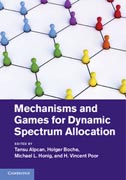
Mechanisms and Games for Dynamic Spectrum Allocation
Alpcan, Tansu
Boche, Holger
Honig, Michael L.
Poor, H. Vincent
Presenting state-of-the-art research into methods of wireless spectrum allocation based on game theory and mechanism design, this innovative and comprehensive book provides a strong foundation for the design of future wireless mechanisms and spectrum markets. Prominent researchers showcase a diverse range of novel insights and approaches to the increasing demand for limited spectrum resources, with a consistent emphasis on theoretical methods, analytical results and practical examples. Covering fundamental underlying principles, licensed spectrum sharing, opportunistic spectrum sharing, and wider technical and economic considerations, this singular book will be of interest to academic and industrial researchers, wireless industry practitioners, and regulators interested in the foundations of cutting-edge spectrum management. INDICE: Part I. Theoretical Fundamentals: 1. Games and mechanisms for networked systems: incentives and algorithms A. K. Chorppath, T. Alpcan and H. Boche; 2. Competition in wireless systems via Bayesian interference games S. Adlakha, R. Johari and A. Goldsmith; 3. Reacting to the interference field M. Debbah and H. Tembine; 4. Walrasian model for resource allocation and transceiver design in interference networks E. A. Jorswieck and R. Mochaourab; 5. Power allocation and spectrum sharing in wireless networks: an implementation theory approach A. Kakhbod, A. Nayyar, S. Sharma and D. Teneketzis; 6. Performance and convergence of multiuser online learning C. Tekin and M. Liu; 7. Game-theoretic solution concepts and learning algorithms S. M. Perlaza and S. Lasaulce; Part II. Cognitive Radio and Sharing of Unlicensed Spectrum: 8. Cooperation in cognitive radio networks: from access to monitoring W. Saad and H. V. Poor; 9. Cooperative cognitive radios with diffusion networks R. L. G. Cavalcante, S. Sta?czak and I. Yamada; 10. Capacity scaling limits of cognitive multiple access networks E. Nekouei, H. Inaltekin and S. Dey; 11. Dynamic resource allocation in cognitive radio relay networks using sequential auctions T. Wang, L. Song and Z. Han; 12. Incentivized secondary coexistence D. Zhang and N. B. Mandayam; Part III. Management and Allocation of Licensed Spectrum: 13. Self-organizing context-aware small cell networks: challenges and future opportunities A. Khanafer, W. Saad and T. Ba?ar; 14. Economic viability of dynamic spectrum management J. Huang; 15. Auction driven market mechanisms for dynamic spectrum management G. Iosi?dis and I. Koutsopoulos; 16. Enabling sharing in auctions for short-term spectrum licenses I. A. Kash, R. Murty and D. C. Parkes; 17. Economic models for secondary spectrum lease: a spatio-temporal perspective A. Al Daoud, M. Alanyali and D. Starobinski; 18. How to use a strategic game to optimize the performance of CDMA wireless network synchronization G. Bacci and M. Luise; 19. Economics and the efficient allocation of spectrum licenses S. Loertscher and L. M. Marx.
- ISBN: 978-1-107-03412-9
- Editorial: Cambridge University Press
- Encuadernacion: Cartoné
- Páginas: 601
- Fecha Publicación: 19/12/2013
- Nº Volúmenes: 1
- Idioma: Inglés
